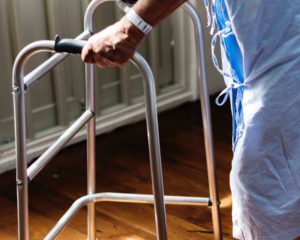Another Dimension Of Dementia Or A Case Of Care Home Abuse?
It’s never easy when age starts to take its toll on your parents. It’s even harder when dementia sets in. While you may have been able to care for them at home if they were in their right mind, a diagnosis of dementia often changes things. The parent in question will become forgetful, confused, and possibly even violent. As such, you wouldn’t be alone in considering a nursing home as your best option for getting them the care they need. Here, you can rest easy that trained and committed staff can take on the responsibility for their care. Often, a protected environment like this is also the best bet for keeping your parent safe.
At least, it should be. The sad reality is, though, that more stories emerge every year of abuse in setting like these. To highlight the issue, consider that more than 2 million cases of abuse are reported every year. While the odd one will reach national news, many such incidences are swept under the carpet. And, that’s something anyone needs to be aware of when paying for such accommodation for their loved ones. There are plenty of paths to take if your parent does fall foul to abuse like this. But, you need to know for sure that abuse is happening before you take them.
The trouble is, things get complicated when a loved one has dementia. The nature of their condition means that they could either confuse things or forget them. It’s entirely possible, then, that they’ll aim accusations without grounding. Either that or they won’t remember what’s happened to tell you about it in the first place. As such, your visits with the parent in question could soon become a matter of reading between the lines. The sad fact is, missing the signs here could lead to the issue continuing for longer. That’s why we’re going to list a few of the things you should look out for on your visits.
Listen for the things they don’t say
As mentioned, you can’t always trust what someone with dementia says, if they say it at all. As such, your single main indicator of abuse will be the body language of your loved one. Again, this isn’t a sure thing or a simple solution. Those with dementia often exhibit fearful body language like that explained on sites such as readingbodylanguagenow.com. This is especially likely if they can’t remember who you are, and will thus be frightened about the visit itself. Still, body language can help detect issues with nursing staff. The chances are, after all, that staff will be in and out during your visit. They may even lead you to and from your parent’s room. If you notice your loved one becomes distressed or closed off the moment staff appear, it may be worth exploring. Again, this is not a sure thing. It may be, for instance, that your loved one has simply taken against a member of staff for no reason. But, there could also be more to the matter, and your parent relies on you to get to the bottom of that.
Watch nurse-patient interactions
During your visits, it’s also worth keeping on ear out for nurses, especially if you have cause for concern. Either through watching staff with your loved one or with other patients, you’ll get an idea of their bedside manner. Admittedly, it’s unlikely you’ll witness full-blown abuse during a visit. You may still spot things which worry you, such as abrupt bedside manners or excessive force. If you spot this in interactions with another patient, your best bet is to ask to speak with a manager. Leaving a complaint ensures a close eye will be kept on the staff member in question. In a roundabout way, that could be the first step in making sure your loved one receives the care they deserve.
Look out for physical signs of abuse
This pointer is hardest of all, but it’s the most definite sign you could get that something isn’t right. If you have suspicions, you may still be reluctant to act on them. After all, they’re unfounded, and you don’t want to ruin a good person’s career. But, you can’t ignore your feeling that things aren’t right. So, during your next visit, you should look out for signs of physical abuse. Areas such as the wrists and ankles are particularly prevalent here. Still, bruising from abuse can occur anywhere. During your visit, pay as much attention as you can to any worrying bruises. If you’re really concerned, see if you can’t visit before bedtime and help your parent get dressed. That way, you’ll be able to see for sure if anything is going on. If you do spot problems here, don’t go to the manager. Instead, contact lawyers, like those you’ll find it you visit thedicksonfirm.com, who specializes in cases like these. In extreme cases, you may even want to remove your loved one immediately. You could then keep them home until you gain compensation to pay for a new nursing home.
Track changes in health
This one will be difficult, and again it’s unreliable. Still, you should also make an effort to track the health of your loved one. To some extent, worsening health could be a symptom of the aging process. Certain health declines, though, could also be symptoms of abuse. After all, abuse isn’t only physical. Neglect is also a serious issue and could make itself known through things such as dehydration or weight loss. As such, always ask after the health of your parent. Take note, too, of any severe differences you notice across visits. By returning at least a few times a week, you’ll be able to spot issues straight away, and shouldn’t hesitate to ask about them. It may be that your loved one has simply been under the weather. Or, they may not be getting the care they need. It’s down to you to do the detective work to find out either way.


